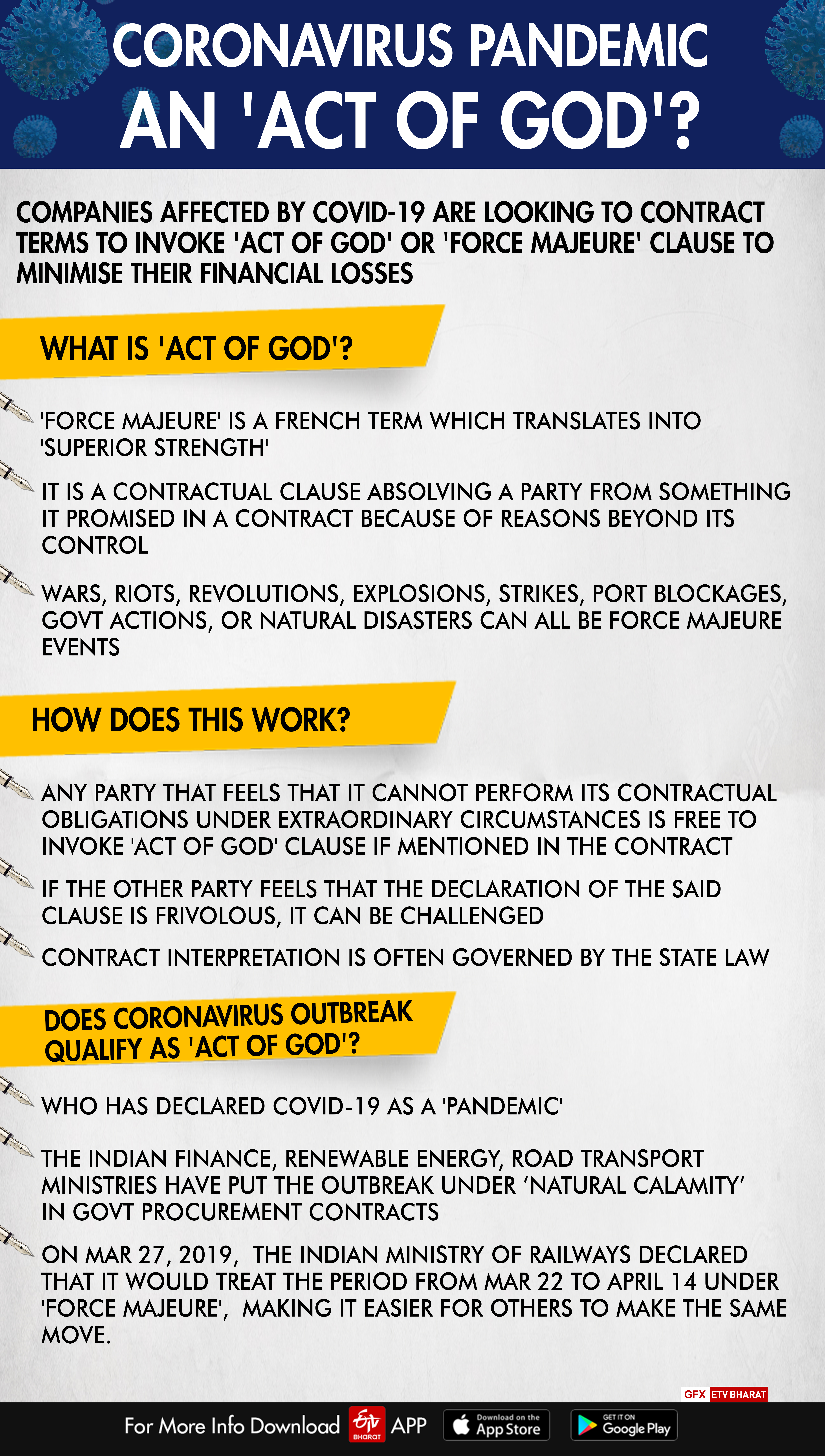Hyderabad: With the outbreak of novel coronavirus and consequential lockdown disrupting almost all kinds of economic activity across the country, more and more enterprises including some of the biggest players such as Adani Ports - India's largest private multi-port operator, Indian Oil - Indian government-owned oil and gas company, PVR Cinemas - India's largest multiplex chain, among others, have decided to invoke the 'Act of God' clause, with many others likely to follow suit.

Also known as 'Force Majeure', the 'Act of God' clause often proves to be a safe passage for most corporates and commercial players as it exempts them from contractual obligations such as payment of rent, and loans, among other things.
What is 'Act of God'?
'Force Majeure' a French term which translates into 'superior strength' is a contractual clause which absolves a party from something it promised in a contract because of reasons beyond its control.
Interestingly the Indian Contract Act, 1872 - the 148-year-old law governing contracts in India - does not expressly refer to 'Force Majeure'.
However, section 32 (deals with contingent contracts) and 56 (embodies the doctrine of frustration) of the Act implicitly provide for the legal parlance, that when a major unforeseeable ‘Act of God’ event - like a natural disaster - occurs, companies can use it to protect itself from liability to perform an obligation. Of course, force majeure has to be part of the original contract between the two parties, to begin with.
Wars, riots, revolutions, explosions, strikes, port blockades, government actions, or natural disasters such as floods, earthquakes and tsunamis can all be force majeure events.
How does this work?
Any party which feels that it cannot perform its contractual obligations under extraordinary circumstances is free to invoke 'Act of God' clause if mentioned in the contract.
But lawyers responsible for the agreement mostly comb through contracts carefully to determine what’s covered and what’s not.
And, if the other party feels that the declaration of the said clause is on flimsy grounds, it can be challenged, as there’s more to it than merely invoking the 'Act of God'.
Contract interpretation is often governed by state law. In some jurisdictions, businesses must be able to demonstrate that disruptions to their work really were beyond their control and that they couldn’t have figured out a work-around.
In other jurisdictions, they must also show that the problem wasn’t foreseeable - a standard that could make it tougher to invoke force majeure in contracts finalized after the coronavirus outbreak gained steam as a global problem.
Does coronavirus outbreak qualify as 'Act of God'?
Contracts including the 'Act of God' clause often explicitly spell out the conditions or events that qualify for the invocation of the parlance including natural disasters, war and unforeseen government actions. They, may sometimes, also include pandemics, epidemics, and broad “catch-all” language for events beyond a party’s control.
With the World Health Organisation (WHO) declaring COVID-19 as a pandemic and the Indian finance, renewable energy as well as road transport ministries putting the outbreak under ‘natural calamity’ in government procurement contracts, many believe that the requirements to invoke the clause have been met.
Especially, considering the extra-ordinary situation that persists due to the nationwide lockdown.
In fact, the Indian Ministry of Railways on March 27 declared in a tweet that it would treat the period from 22.03.20 to 14.04.20 under 'force majeure', thereby making it easier for others to make the same move.



